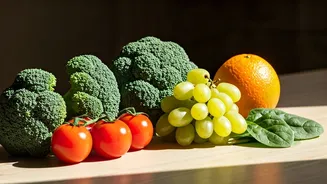Introduction: Dietary Defense
The relationship between diet and colon cancer is a significant aspect of preventative health. A specialist in gastroenterology from AIIMS shares valuable
insights into the top ten foods that can protect against this disease. This information equips individuals to make better choices and fortify their defenses. The goal is to provide accessible, actionable advice for a healthier future.
Fiber-Rich Foods
Fiber stands out as a critical element in preventing colon cancer. Foods high in fiber, such as whole grains, fruits, and vegetables, aid in regular bowel movements. This helps to eliminate potential carcinogens from the colon. It is advisable to incorporate fiber-rich meals into daily diets. Examples include oats, apples, broccoli, and other foods rich in dietary fiber. Such changes not only enhance digestive health but also actively work to decrease the risk of colon cancer.
Cruciferous Vegetables
Cruciferous vegetables such as broccoli, cauliflower, cabbage, and Brussels sprouts are packed with compounds that can actively combat cancer. These vegetables are noted for their high glucosinolate content, which breaks down into isothiocyanates. These isothiocyanates have been shown to hinder the growth of cancer cells and trigger their elimination. A diet rich in cruciferous vegetables provides a potent defense and offers a way to enhance overall health. These vegetables are easy to add to a meal plan in various ways.
Berries: Antioxidant Boost
Berries are rich in antioxidants, notably anthocyanins, which protect cells from damage by free radicals. The antioxidants found in berries protect the colon cells from harm and assist in preventing cancerous mutations. Strawberries, blueberries, raspberries, and blackberries are great choices to include in your diet. Eating a cup of mixed berries provides a delicious and powerful boost to your anti-cancer efforts.
Leafy Green Vegetables
Leafy green vegetables are essential for a cancer-preventative diet. Spinach, kale, and lettuce are packed with vitamins, minerals, and antioxidants that protect colon cells. These greens are rich in folate, which is an important vitamin for cell health. Including a generous helping of leafy greens in your diet provides a versatile and nutritious shield against colon cancer, offering a pathway toward a stronger digestive system. Their ease of use makes them valuable for daily dietary needs.
Tomatoes: Lycopene Power
Tomatoes are a good source of lycopene, a potent antioxidant which gives them their red color. Lycopene can help limit the growth of cancer cells in the colon. Studies have shown that a diet that includes tomatoes can significantly decrease the risk of several cancers, including colon cancer. Whether consumed raw, cooked, or in sauces, tomatoes can be a simple addition to a healthy diet that can improve overall health.
Garlic and Onions
Garlic and onions, members of the allium family, are recognized for their cancer-fighting properties. They contain sulfur compounds that can protect cells from cancer. These compounds may block the development of cancerous cells and increase the body’s defenses. It is easy to incorporate garlic and onions into your diet to enhance the taste and reduce the chances of cancer. These ingredients add flavor and boost protective benefits.
Fatty Fish
Fatty fish, such as salmon, sardines, and mackerel, are abundant in omega-3 fatty acids, which provide health benefits. Omega-3 fatty acids possess anti-inflammatory properties, reducing cancer risk. Regular intake of these fish is associated with a decrease in the risk of colon cancer and other health issues. For added benefits, incorporate fatty fish into a balanced diet.
Nuts and Seeds
Nuts and seeds are good sources of fiber, healthy fats, and antioxidants. These components work together to protect cells and support overall health. Almonds, walnuts, flaxseeds, and chia seeds offer essential nutrients that have cancer-preventative effects. Adding a handful of nuts and seeds to your meals is an easy and effective way to enhance the nutritional profile of your food, supporting overall well-being and reducing the risk of colon cancer.
Healthy Cooking Oils
Choosing healthy cooking oils is a critical part of a colon-cancer-prevention strategy. Olive oil, known for its anti-inflammatory and antioxidant properties, can assist in protecting colon cells. These oils can enhance the absorption of nutrients, offering extra advantages. Switching to healthy cooking oils can reduce the risk of colon cancer while also improving the flavor and health benefits of your meals. This simple swap will bring noticeable improvements.
Probiotics and Fermented Foods
Probiotics and fermented foods boost the population of beneficial bacteria in the gut, thereby supporting digestive health. These bacteria help in maintaining a balanced gut microbiome, which is essential to prevent colon cancer. Yogurt, kefir, sauerkraut, and kimchi are excellent sources of probiotics. By introducing these foods, people can strengthen their digestive system and protect against colon cancer. This is a dietary change that has many beneficial effects.















